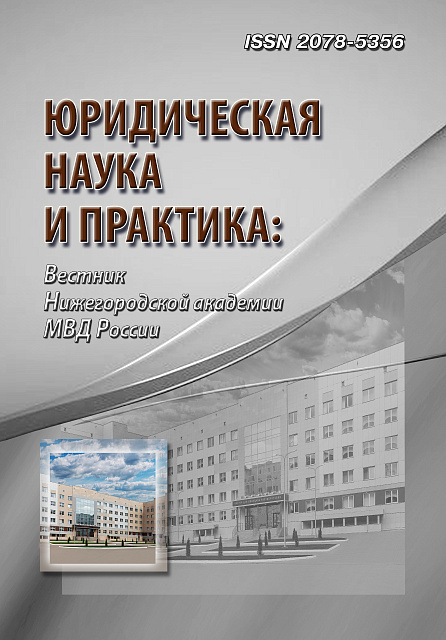Russian Federation
The article presents a historical and legal study of corruption as a multifaceted and multifaceted social phenomenon that originated during the emergence of the first states on earth and has come down to our time in all the variety of forms of abuse of power by individual officials or groups of people endowed with power. Despite the fact that many hundreds of scientific papers have been devoted to the phenomenon of corruption, which existed in one form or another in different historical periods, this social phenomenon continues to be an urgent and topical problem for Russian and foreign researchers, requiring constant attention from society due to its exceptional toxicity, significant expenditure of forces and means to combat it by each specific state individually and by the entire international community as a whole. In this regard, the works carried out within the framework of historical and legal research by the outstanding thinkers of the last century Johan Huizinga and Paul Zymthor, who devoted a significant part of their work to the study of corruption as a controversial social phenomenon that existed in the Netherlands in the Middle Ages, are of exceptional scientific value. The idea of a comparative approach to the phenomenon of corruption with its ambiguous and changeable nature, revealed and described in the last century in the works of J. Huizinga and P. Zymthor, received real confirmation in the existing reality in which modern Dutch society found itself. The article also tells about the activities of the humanist writer J. Huizinga, directed against the ideology of fascism, and the brutal repressions committed by the Nazis against this outstanding person.
historians Johan Huizinga and Paul Zyumtor, forms of corruption in the Netherlands, the era of torture justice, an atmosphere of obscurantism, cruelty, violence, destructive behavior of officials, police and militia during the Middle Ages
1. United Nations Convention against Corruption. Adopted by resolution 58/4 of the General Assembly of October 31, 2003. URL: https://www.un.org/ru/documents/decl_conv/conventions/corruption.shtml (accessed 12.07.2022). (In Russ.)
2. Huizinga J. About the historical ideals of life. Per. from the Dutch. I. Mikhailova / ed. by Yu. Kolker. Overseas Publications Interchange Ltd. London, 1992. (In Russ.)
3. Huizinga J. Homo ludens. In the shadow of tomorrow / transl. from Netherl. and approx. V. V. Oshisa; ed. by G. M. Tavrizyan. Moscow: “Progress” Publ., “Progress-Academy” Publ., 1992. (In Russ.)
4. Huizinga J. Autumn of the Middle Ages / transl. from Netherl. D. V. Silvestrova / A. V. Mikhailova; comment. by D. E. Kharitonovich; resp. ed. by S. S. Averintsev. Moscow: Nauka Publ., 1988. (In Russ.)
5. Huizinga J. Geschonden wereld. Een beschouwing over de kansen op herstel van onze beschaving. H. D. Tjeenk & N. V. Zoon. Haarlem, 1945.
6. Huizinga J. Culture of the Netherlands in the XVII century. Erasmus. Selected letters. Drawings / transl. from the Netherl. and foreword by D. Silvestrov; comment. by D. Kharitonovich. St. Petersburg: Ivan Limbakh Publ., 2009. (In Russ.)
7. Kislukhin V. A. Police of the Benelux Union States: Historical and Legal Aspect (from Antiquity to Modern Times). Legal Science and Practice: Bulletin of the Ministry of Internal Affairs of Russia, 2014, no. 1 (25). (In Russ.)
8. Huizinga J. URL: https://ru.wikipedia.org/wiki/ (accessed 12.07.2022). (In Russ.)
9. Zyumtor Paul. URL: https://ru.wikipedia.org/wiki/ (accessed 12.07.2022). (In Russ.)
10. Dutch revolution. URL: https://ru.wikipedia.org/wiki/ (accessed 12.07.2022). (In Russ.)
11. Zyumtor P. Wilhelm the Conqueror / transl. from Fr. V. D. Balakin; entry art. by V. V. Erlikhman. Moscow: Young Guard Publ., 2010. 309 p. (In Russ.)
12. Zyumtor P. Everyday life of Holland in the time of Rembrandt. Lewandowski A. Holland’s Golden Age / transl. from Fr. M. F. Glagoleva. Moscow: Young Guard Publ., 2001. (In Russ.)
13. Kislukhin V. A. History of the fight against corruption in the Netherlands and the role of the police in this activity. History of State and Law, 2010, no. 2. (In Russ.)












